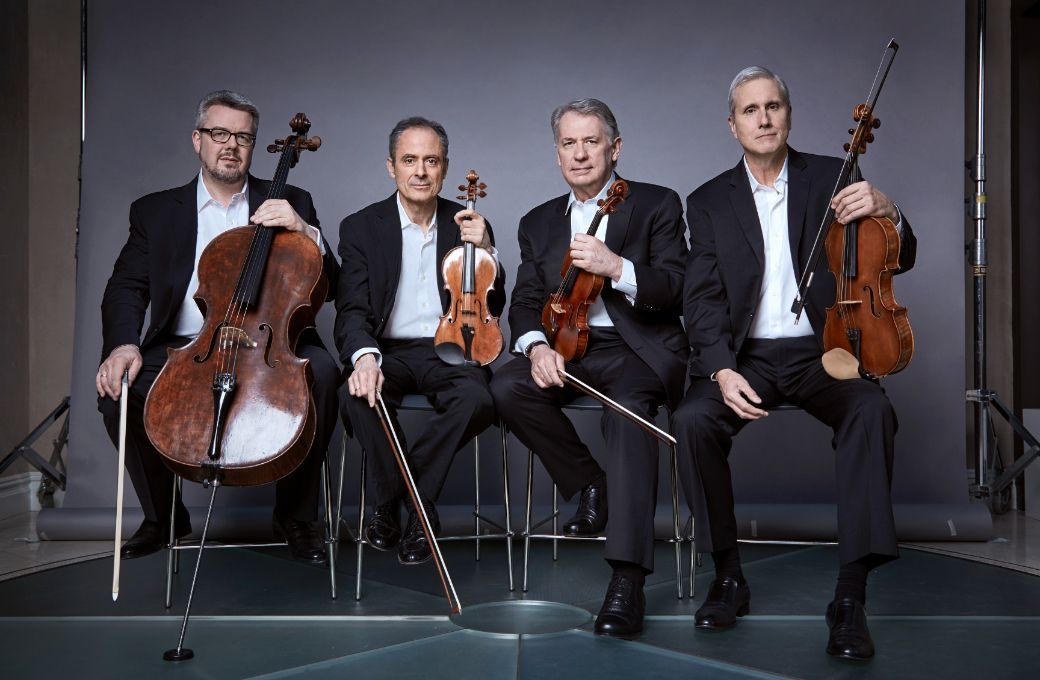After 47 years on the concert stage, next weekend marks the farewell performance of the Emerson String Quartet, to be held in New York City. Just ahead of that, however, was a star-studded appearance in Cleveland, where the ensemble is well-known to local audiences as a regular fixture at the Cleveland Chamber Music Society. Moreover, violinist Philip Setzer is a Cleveland native whose parents were both Cleveland Orchestra members.

Quite a departure from a standard string quartet recital, Sunday’s program showed the Emerson in collaboration with a line-up of guests that was headlined by Renée Fleming and also included pianist Simone Dinnerstein and actress Merle Dandridge. Three disparate selections were performed with little in the way of a common thread other than the talents of the artists engaged.
Solo piano opened the evening, with Dinnerstein presenting Philip Glass’ Etude no. 6. It was a reflective way to begin the program, with the pianist drawing a broad expressive range, finding drama, not stasis, in its hypnotically pulsating repetitions that built to powerful climaxes before abruptly retreating to silence.
A bit of an odd prelude, though, to Beethoven’s String Quartet no. 14 in C sharp minor. Remarkably forward-thinking, even amongst Beethoven’s late quartets, Op.131 is a daunting quantity that takes the skill and experience of the Emersons to pull off convincingly. Though the ensemble’s vast discography creates an enduring legacy, how gratifying it was to have an opportunity to hear them work their magic in the flesh one last time. A lone strand in the violin opened, in due course joined by the others, probing profound melancholy and often hanging high in the stratosphere. The balance and control were absolute, the fruits of nearly half a century.
The main event of the program was André Previn’s monodrama Penelope, scored for soprano, narrator, piano and string quartet. The work was left incomplete at the time of Previn’s death; some degree of conjecture as to the composer’s intentions was done by editor David Fetherolf when preparing the score for performance. Playwright Tom Stoppard – a Previn collaborator dating back to Every Good Boy Deserves Favour (1977) – supplied a wordy libretto, bringing to life the inner emotions of the titular wife of Odysseus from Homer’s epic. The text centers on her 20-year wait for her husband’s return from the Trojan War, and the scene in which he returns to her disguised as a beggar, as told from her point of view. Both soprano and narrator embodied Penelope, presenting her in dialogue with herself.
Contemplative material in the strings opened, setting the stage for the narrative that unfolded over the next 40 minutes. I confess that this wasn’t a work I was able to immediately connect with on first hearing, and I’m not sure it would age particularly well on successive listens given its verbosity. Previn wrote extensively for Fleming, most notably the role of Blanche DuBois in his operatic treatment of A Streetcar Named Desire. The vocal line of Penelope was a tailored fit to Fleming’s voice, and she delivered it with sincerity and compassion in her recognizable honeyed soprano. Yet one wanted to hear her in an extended operatic flowering, but the discursive nature of work and interjections from the narrator scarcely allowed for it.
As narrator, Dandridge offered a delivery in stark contrast to Fleming, but a nuanced, expressive performance in its own right. Varied textures were had by the piano, sometimes relegated to the background, elsewhere richly flowing and virtuosic, helping to bind the ensemble together. It’s a story that has a happy ending, though, arriving at warm resolution with the quartet rightfully getting the final word.


